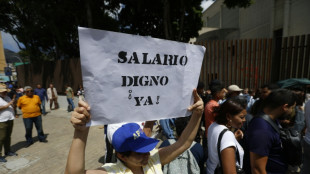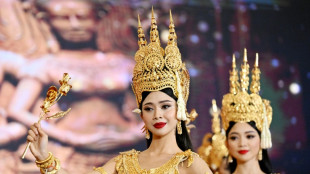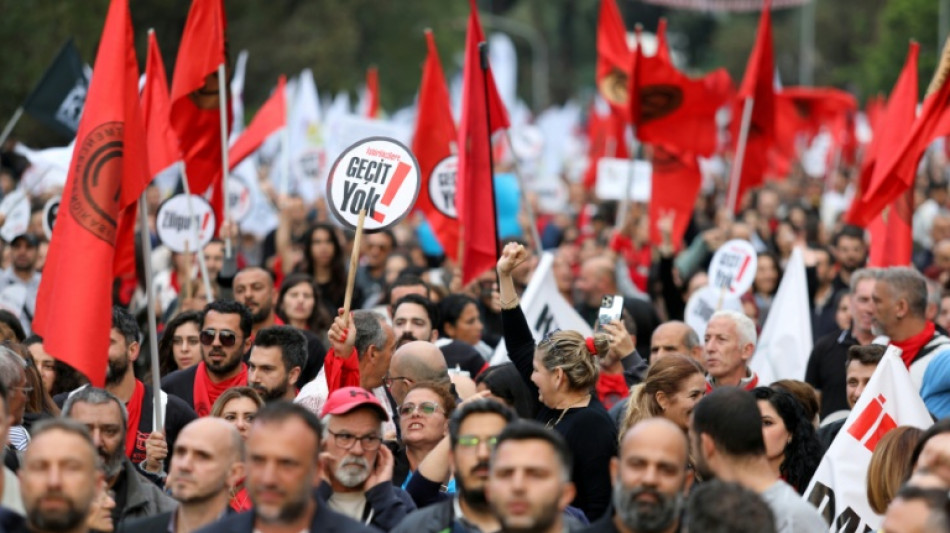
-
 Scotland spoil Italy's T20 World Cup debut with big win
Scotland spoil Italy's T20 World Cup debut with big win
-
Stocks track Wall St rally as Tokyo hits record on Takaichi win
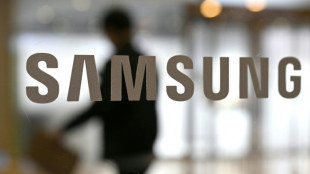
-
 Israeli president says 'we will overcome evil' at Bondi Beach
Israeli president says 'we will overcome evil' at Bondi Beach
-
Munsey leads Scotland to 207-4 against Italy at T20 World Cup

-
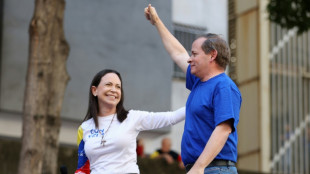 Venezuela's Machado says ally 'kidnapped' after his release
Venezuela's Machado says ally 'kidnapped' after his release
-
Japan restarts world's biggest nuclear plant again

-
 Bangladesh poll rivals rally on final day of campaign
Bangladesh poll rivals rally on final day of campaign
-
Third impeachment case filed against Philippine VP Duterte

-
 Wallaby winger Nawaqanitawase heads to Japan
Wallaby winger Nawaqanitawase heads to Japan
-
Thailand's Anutin rides wave of nationalism to election victory

-
 Venezuela's Machado says ally kidnapped by armed men after his release
Venezuela's Machado says ally kidnapped by armed men after his release
-
Maye longs for do-over as record Super Bowl bid ends in misery

-
 Seahawks' Walker rushes to Super Bowl MVP honors
Seahawks' Walker rushes to Super Bowl MVP honors
-
Darnold basks in 'special journey' to Super Bowl glory

-
 Japan's Takaichi may struggle to soothe voters and markets
Japan's Takaichi may struggle to soothe voters and markets
-
Bad Bunny celebrates Puerto Rico at Super Bowl, angering Trump
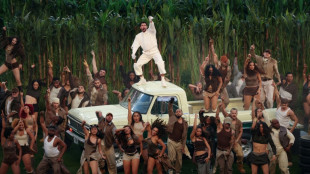
-
 Seahawks soar to Super Bowl win over Patriots
Seahawks soar to Super Bowl win over Patriots
-
'Want to go home': Indonesian crew abandoned off Africa demand wages

-
 Asian stocks track Wall St rally as Tokyo hits record on Takaichi win
Asian stocks track Wall St rally as Tokyo hits record on Takaichi win
-
Hong Kong sentences pro-democracy mogul Jimmy Lai to 20 years in jail
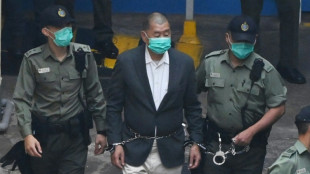
-
 Bad Bunny celebrates Puerto Rico in joyous Super Bowl halftime show
Bad Bunny celebrates Puerto Rico in joyous Super Bowl halftime show
-
Three prominent opposition figures released in Venezuela

-
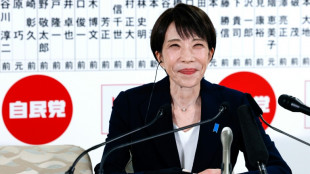 Japan PM Takaichi basks in historic election triumph
Japan PM Takaichi basks in historic election triumph
-
Israeli president says 'we shall overcome this evil' at Bondi Beach

-
 'Flood' of disinformation ahead of Bangladesh election
'Flood' of disinformation ahead of Bangladesh election
-
Arguments to begin in key US social media addiction trial

-
 Gotterup tops Matsuyama in playoff to win Phoenix Open
Gotterup tops Matsuyama in playoff to win Phoenix Open
-
New Zealand's Christchurch mosque killer appeals conviction

-
 Leonard's 41 leads Clippers over T-Wolves, Knicks cruise
Leonard's 41 leads Clippers over T-Wolves, Knicks cruise
-
Patriots-Seahawks Super Bowl approaches as politics swirl
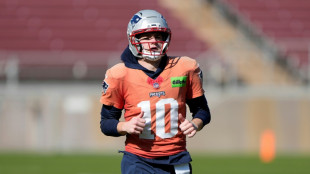
-
 Trump says China's Xi to visit US 'toward the end of the year'
Trump says China's Xi to visit US 'toward the end of the year'
-
Real Madrid edge Valencia to stay on Barca's tail, Atletico slump

-
 Malinin keeps USA golden in Olympic figure skating team event
Malinin keeps USA golden in Olympic figure skating team event
-
Lebanon building collapse toll rises to 9: civil defence

-
 Real Madrid keep pressure on Barca with tight win at Valencia
Real Madrid keep pressure on Barca with tight win at Valencia
-
Dimarco helps Inter to eight-point lead in Serie A, Juve stumble

-
 PSG trounce Marseille to move back top of Ligue 1
PSG trounce Marseille to move back top of Ligue 1
-
Two prominent opposition figures released in Venezuela
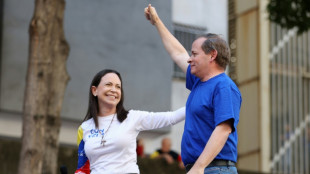
-
 Hong Kong to sentence media mogul Jimmy Lai in national security trial
Hong Kong to sentence media mogul Jimmy Lai in national security trial
-
Lillard will try to match record with third NBA 3-Point title

-
 Vonn breaks leg as crashes out in brutal end to Olympic dream
Vonn breaks leg as crashes out in brutal end to Olympic dream
-
Malinin enters the fray as Japan lead USA in Olympics team skating

-
 Thailand's Anutin readies for coalition talks after election win
Thailand's Anutin readies for coalition talks after election win
-
Fans arrive for Patriots-Seahawks Super Bowl as politics swirl

-
 'Send Help' repeats as N.America box office champ
'Send Help' repeats as N.America box office champ
-
Japan close gap on USA in Winter Olympics team skating event

-
 Liverpool improvement not reflected in results, says Slot
Liverpool improvement not reflected in results, says Slot
-
Japan PM Takaichi basks in election triumph

-
 Machado's close ally released in Venezuela
Machado's close ally released in Venezuela
-
Dimarco helps Inter to eight-point lead in Serie A


Turkish Cypriots protest new rule allowing hijab in school
Several thousand Turkish Cypriots marched on Friday to protest a new regulation allowing pupils to wear Islamic headscarves in secondary schools, a move critics say threatens the community's secular traditions.
The rule, introduced in March in the breakaway Turkish Republic of Northern Cyprus -- recognised only by Turkey -- amended the school disciplinary code to explicitly permit headscarves in high schools. Middle schools were left to adopt the rule at their own discretion.
"This is a religious symbol. A child under the age of 18 cannot make this decision with their own free will, in my opinion," said Dila Ensari, 15, who attended the rally with her mother, a public school teacher.
The government's decision followed an incident in which an eighth-grade girl in Nicosia was reportedly barred from school because she was wearing a hijab. In a video that quickly went viral, the student, dressed in a blue headscarf, and her father are seen outside the school gates arguing with staff, while other students file in.
The backlash to the regulation was swift. Educators, trade unions and opposition leaders condemned the move as an erosion of long-held secular traditions and a politicisation of the education system.
"They say they want to legitimise hijabs at school, but we know this won't stop here," said Sara, a 30-year-old teacher who declined to give her full name for fear of repercussions.
"We are for secular education. If one of my students wants to wear a hijab after 18, I'll be here protesting for her right to do so."
Burak Mavis, head of the Cyprus Turkish Teachers' Trade Union, echoed that concern.
"Granting exceptions to religious symbols in public schools is a practice that is contrary to secularism and also threatens the development of children," he told AFP before the rally.
Turkish Cypriot leader Ersin Tatar defended the new regulation, saying it protects students from discrimination.
"In this country, there are those who have religious beliefs and those who do not. There are those who go to mosques and those who do not. These are personal choices," he told a morning talk show last month.
Although overwhelmingly Muslim, Turkish Cypriots largely identify as secular.
Hijabs are rarely worn, many consume alcohol and more devout individuals tend to observe their religious practices in private.
"Most Turkish Cypriots don't practise religion publicly, and if they do, they want to keep it in the private sphere. There's never been a push to bring religious symbols into public life," said Umut Bozkurt, a political scientist at Eastern Mediterranean University.
Many residents draw a clear distinction between themselves and migrants from mainland Turkey -- who by some estimates now outnumber the Turkish Cypriot population -- and are often seen as more religious and conservative.
- 'Different culture' -
For many, the headscarf regulation is seen as the latest example of Ankara's growing influence in the north.
"They see it as a threat to their relative autonomy from Turkey," Bozkurt said.
Turkey still maintains a substantial military presence in northern Cyprus decades after its 1974 invasion and exercises huge influence over the breakaway administration.
"We love Turkey, (but) our culture is different," said Ahmet Serdaroglu, head of the Kamu-Is trade union.
"I am Muslim — praise be to God... but I don't have to cover my baby's head" to prove it.
Under the amended policy, headscarves must be of one colour and consistent with school uniforms. Officials say the regulation is about fairness, not religious imposition.
In secondary schools in the two-thirds of Cyprus controlled by the internationally recognised government, pupils may wear headscarves and other religious attire, although few Turkish Cypriots are enrolled in them.
The island has been divided along broadly communal lines since soon after Ankara occupied its northern third in 1974 in response to an Athens-engineered Greek Cypriot coup seeking union with Greece.
The debate mirrors past struggles in Turkey, where a 2013 decision to lift a longstanding ban on Islamic headscarves in public high schools was seen by secularists as a turning point.
Now, many Turkish Cypriots fear they are on the same path.
K.AbuDahab--SF-PST


